LOS ANGELES — Back in 2020, Kia made a huge impression with its Telluride three-row SUV. It gained unanimous praise and numerous awards for its spaciousness, design and general excellence. With four years under its belt, the Telluride remains the best in its class, even in the face of newer rivals. So what’s next? Simply put, take all that worked with the Telluride and combine it with elements of another Kia hit, the electric EV6. The result is the 2024 Kia EV9, and it raises the question: “Can lightning strike thrice?”
We were some of the first to drive the all-new EV9 in its U.S.-spec form at the Hyundai/Kia proving grounds in the high desert north of Los Angeles. After putting this three-row electric SUV through its paces in a variety of conditions, we can answer that question with a confident, “yes.”
When the EV9 goes on sale at the end of 2023, it will be offered in five trims: Light, Light Long Range, Wind, Land and GT-Line. Unfortunately, pricing is not yet available.
The entry-level Light model comes with a 76.1-kilowatt-hour battery pack in the floor that powers a single motor on the rear axle. Range is estimated by Kia at 223 miles on a full charge and power output comes to 215 horsepower and 258 pound-feet of torque. That’s a modest amount of a heavy three-row vehicle, but it should still get the EV9 to 60 mph in a not-slow 7.7 seconds.
The Light Long Range steps up to a 99.8-kWh battery and dials back output to 201 hp (torque remains the same). That should push the range to 300 miles, but significantly lengthens its 0-60 time to 8.8 seconds. If you’re looking for the longest-range model in the EV9 lineup, this is it.
Things get more serious with the Wind trim. It adds a second motor up front for all-wheel-drive and a combined output of 379 hp and 443 lb-ft. Range drops to a still-above-average 270 miles and acceleration improves to a rapid 5.7 seconds. If you opt for the larger 20-inch wheels, range is further reduced to 253 miles. It’s also worth noting that Kia will offer a Boost “Feature on Demand” (FoD) that can be purchased through the infotainment system that increases torque to 516 lb-ft. We’ll get into FoD a bit later.
The Land trim has identical power output specs as the Wind, but its standard 20-inch wheels have it stuck at 253 miles of range.
The top GT-Line comes with the higher 516 lb-ft of torque and 21-inch wheels, resulting in an estimated range of 243 miles. It should hit 60 mph in only 5.0 seconds.
Although battery size and performance contribute to range, so does efficiency, and for that, the EV9 isn’t exactly miserly. While a long-range, all-wheel-drive EV6 returns an EPA-estimated 109 miles-per-gallon equivalent (mpg-e), the comparable EV9 Wind AWD is good for only 79 mpg-e. It goes down to 71 for the GT-Line (and conversely, up to 86-87 mpg-e for the Light trims). This is akin to a Rivian R1S. Electricity isn’t free, so much like gas-powered family vehicles, opting for a bigger model is going to cost you more to refuel.
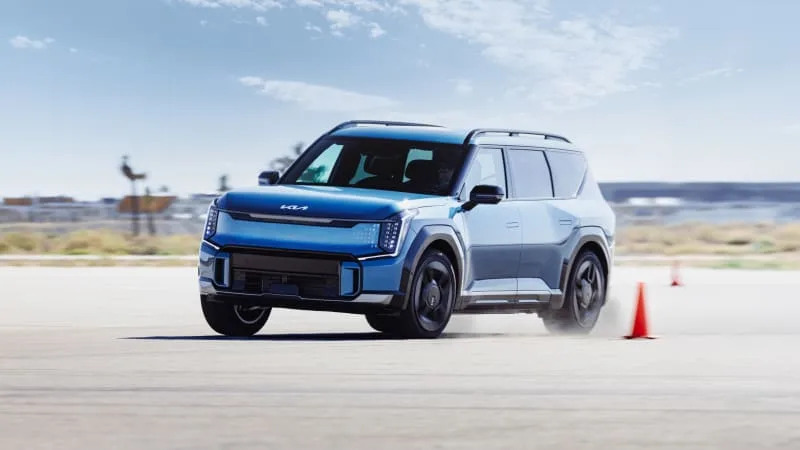
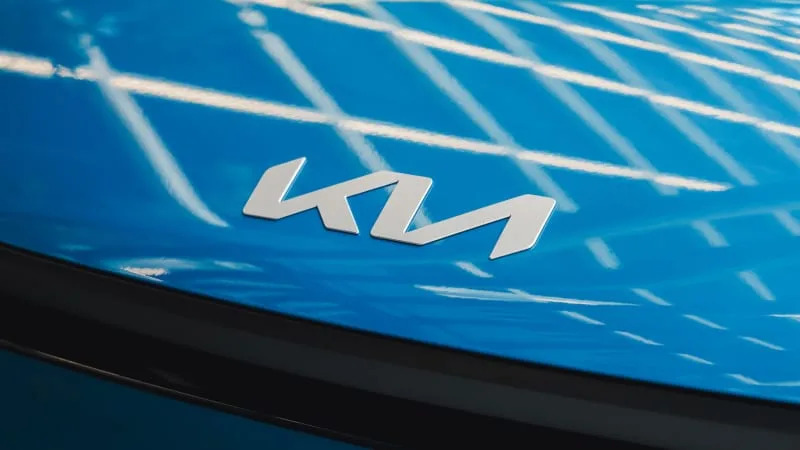
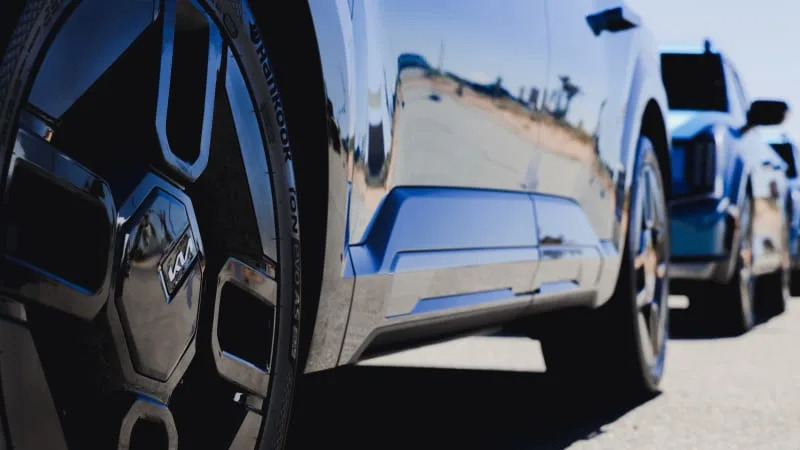
We drove the top GT-Line throughout the day and came away impressed. As expected, acceleration is immediate and with no drama. Just floor the pedal and the EV9 tracks straight in relative silence. It’s quicker than most drivers will ever need. In panic stops from 70 mph, the blocky SUV is just as stable and controllable. Kia claims it will come to a stop from 62 mph in 128 feet, which is respectable for a vehicle weighing between 5,000 and 5,900 pounds (a Telluride tops out at only about 4,500).
When navigating turns, the EV9 exhibits some body roll, but it’s not at all excessive. It traces through curves with confidence and transitions between left and rights gracefully. When pushed harder than is prudent, this big SUV still feels stable, though it doesn’t encourage you to push it further. The front tires predictably surrender grip first and you have plenty of time to react and regain full control. You can indeed have some fun behind the wheel, but most three-row SUV drivers will never have the desire to. Instead, the handling dynamics serve to instill high levels of assurance when you need to maneuver in an instant.
We also had the opportunity to test the EV9 on a moderate off-road course. With only 7.8 inches of ground clearance, its terrain capabilities are somewhat limited, but short front and rear overhangs help quite a bit. You wouldn’t want to attempt tougher terrain with big rocks or deep mud, but steep climbs up dirt trails should be no problem.
Despite the EV9’s ability to tackle these conditions and its buttoned-down handling, the ride quality remains pleasantly comfortable. It’s tuned more for compliance and bumps in the road are well smoothed over. At the same time, it’s not so soft as to feel floaty. The suspension tuning just feels right for a three-row SUV (much like the Telluride), which is saying something since the EV9 does not benefit from adaptive dampers.
In addition to the EV9’s commendable driving manners, it also has some solid charging stats. The larger battery is able to charge at a 215-kW rate on a DC fast charger and should only require 24 minutes to get from a 10- to 80-percent charge. The smaller battery can get there four minutes quicker. That seems like a just-right amount of time for a whole-family pit stop. With an 11-kW Level 2 home charger (or similar public charger), you can expect a full charge to take almost nine hours while the smaller battery will get there in under seven hours.
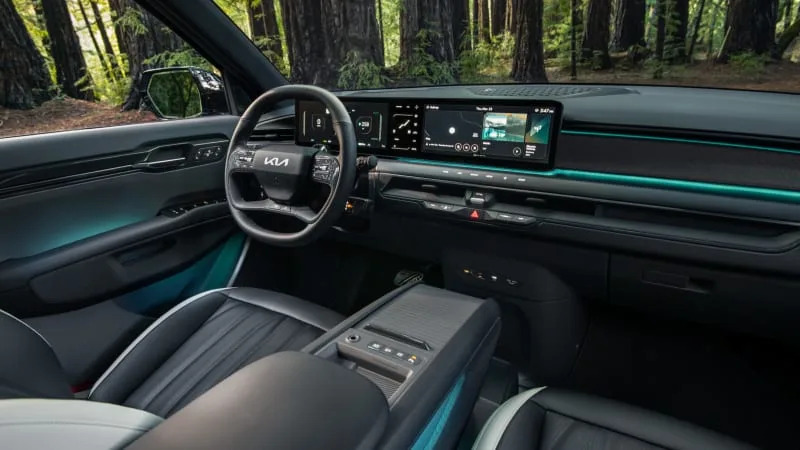
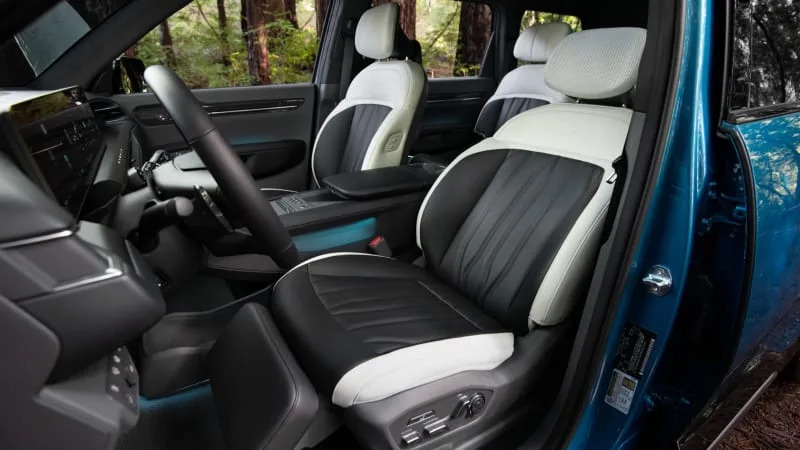
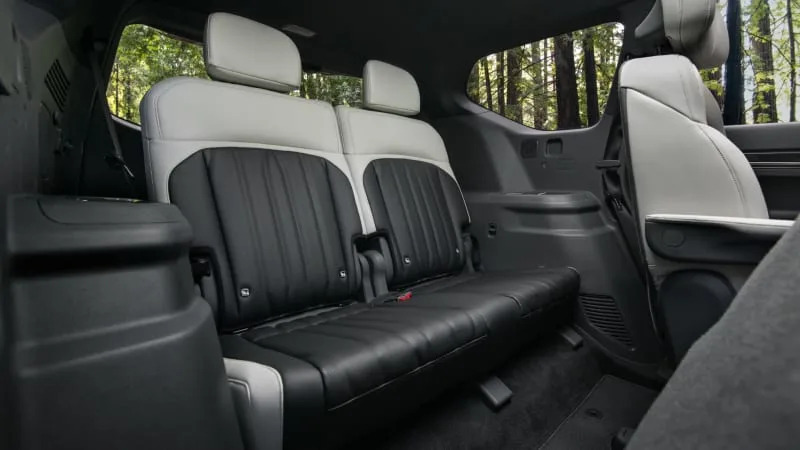
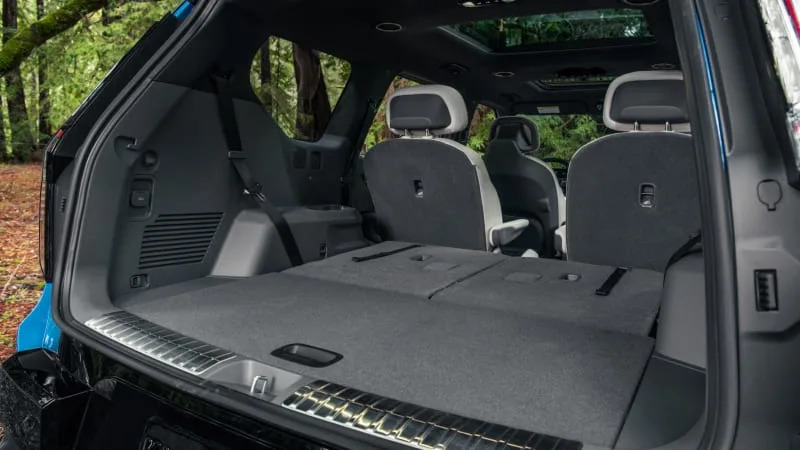
Should you find the charger-adjacent facilities lacking, the top two trims come with a power recliner footrest so you can lay back as though you were in business class. The GT-Line goes further by adding a light massage function, too. All EV9s come with synthetic leather seat upholstery that feels more substantial than the thinner vinyl-like coverings we experienced with the Korean-spec models. We didn’t have enough time to evaluate long-distance comfort on this drive, but the seats left a favorable impression with ample cushioning and support.
The second-row captains’ chairs are just as comfortable, though sadly, they don’t have the swivel function that other markets enjoy. On the top trims, they can be upfitted with heating, ventilation and massage functions. If you’re looking to increase passenger capacity to seven, a second-row bench is standard on the Light and Wind trims.
The third row has enough headroom for adults, but per usual for the three-row crossover SUV segment, legroom is dependent upon how much the second row is slid forward. On paper and in person, it is similar to the Telluride.
Behind the third row, the EV9 can hold up to 21 cubic feet of cargo, which would be comparable to the Telluride (one of the biggest in the segment). With the second and third rows stowed, it can accommodate up to 81.7 cubic feet, which is a bit less than the Telluride’s 87.
The EV9’s capabilities extend well past performance and practicality, too. Technology is another big part of the equation, and Kia is leaning into it in a big way. First off, you get a wide glass enclosure that houses two 12.3-inch displays. One for the instrument panel and a touchscreen for infotainment. Between them is a narrow 5-inch touchscreen dedicated to climate controls.
As many systems now include over-the-air software updates, the EV9 goes a step further with its Features on Demand (FoD). As mentioned earlier, owners can unlock an increase in torque by purchasing it via the Kia Connect Store in the infotainment screen. They can also add unique exterior accent lighting patterns, streaming services and features such as remote parking assist. These features can also be added at the dealership, but FoD gives you just a bit more flexibility and convenience.
There are also plans to add optional lidar sensors to the exterior of GT-Line models to enable conditional hands-free highway driving. This feature will require the lidar hardware, and will not be available as an FoD. On the other hand, all EV9s will be capable of enhanced two-way charging beyond what’s capable in the EV6. Specifically, owners can use the vehicle’s battery to augment their home’s electrical system rather than simply plugging in one or two items (which itself is still pretty useful). Not only does this come in handy for power outages where the EV9 could conceivably supply needed household power for days, but it also gives owners more flexibility in regard to charging.
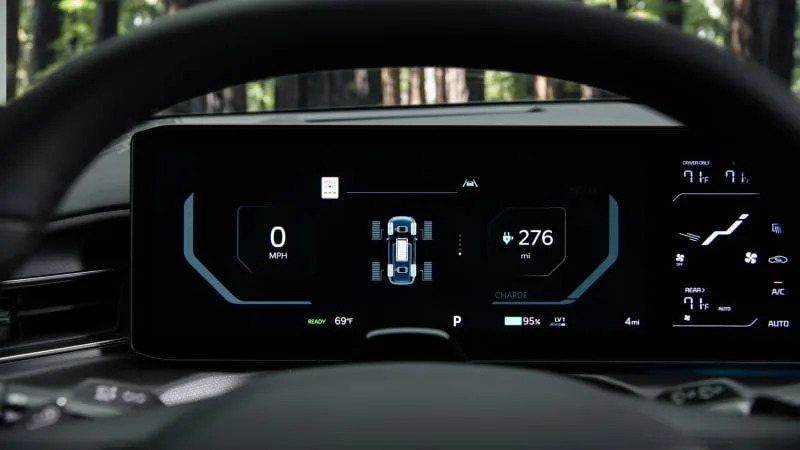
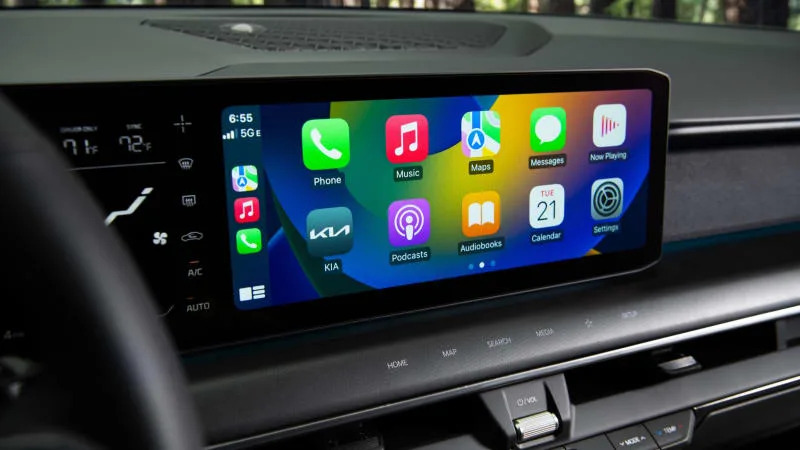
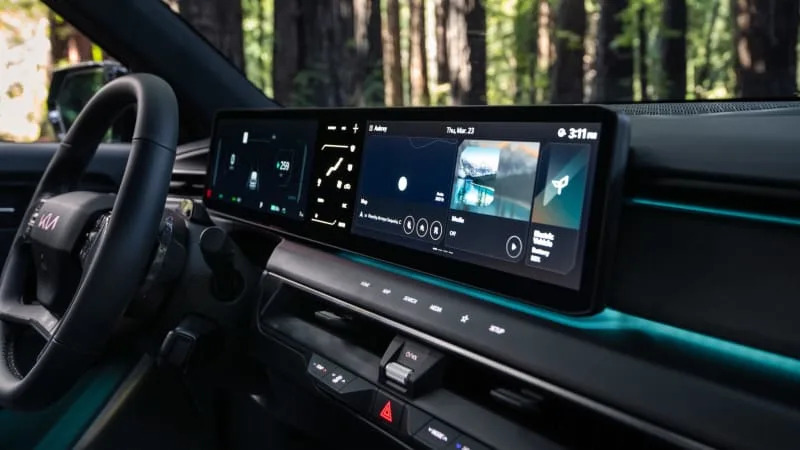
Depending on household demands and rates, a smart interface can draw power from the EV9 when electricity is needed and is more expensive from utilities. When rates drop, charging can resume to save you money. Think of it as the stock market: Buy when it’s cheap and use the battery when it’s expensive.
Speaking of money, things get a little complicated with the EV9 in its first years. Initially, the EV9 will be built in Korea and will not be eligible for the full tax incentives that many American-built EVs enjoy. There is a lease loophole to squeeze past some of those restrictions, though. Production and assembly will eventually take place in Kia’s new plants in Georgia over the next couple of years, at which point they should be eligible for tax incentives.
The future will also bring changes in regard to charging. Kia and Hyundai have joined BMW, GM, Honda, Mercedes-Benz and Stellantis in a still-unnamed conglomerate charge network. This new network has the promise to improve the current patchwork of unreliable non-Tesla public chargers.
With this in mind, along with future features and incentives, some shoppers may be tempted to delay an EV9 purchase, and we wouldn’t blame them. The thing is, the 2024 Kia EV9 is likely to be the only EV with an actually useful third row that doesn’t come with a luxury badge and sky-high price. For the time being, alternatives are limited to the Rivian R1S and heavily flawed Tesla Model X that start around $80,000 (not to mention the six-figure Mercedes-Benz EQS SUV). We’d be shocked if the EV9 costs as much as these.
Perhaps to sweeten the deal, shoppers who place a $1,000 deposit down on an early-October reservation will get a few useful gifts. These include a home charger (or mobile charge cord if you already have a charger), three years of complimentary maintenance, a to-be-determined charging credit and some included features on demand.
Based on our experiences with the 2024 Kia EV9, it has the potential to dominate the EV space in the same way the Telluride ruled its class. With head-turning style, smart tech and the ability to deliver everything three-row SUV shoppers require, there really isn’t a direct rival. You’d either have to downsize to a smaller vehicle or spend much more for one of the aforementioned alternatives. For now, it’s the only choice that also happens to be a great choice.
Related video:




